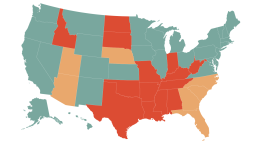In one of the most high-profile abortion cases since the fall of Roe V. Wade, a Texas woman has been battling the state to terminate her high-risk pregnancy — a legal dispute that could have ripple effects for many as the Texas law, one of the strictest in the country, is tested.
Kate Cox, a 31-year-old mother of two, filed a lawsuit last week to end a pregnancy she and her doctors say threatens her life and future fertility. The case triggered a tense legal battle with the eyes of the country watching. The Texas Supreme Court ruled against her on Monday after she left the state to pursue the procedure.
The lawsuit is believed to be one of the first attempts in the country by someone seeking a court-ordered abortion since the Supreme Court?last year overturned Roe v. Wade, according to?the New York Times. The 1973 US Supreme Court ruling established a constitutional right to abortion before fetal viability.
Here’s what we know so far about Cox – and what her case reveals about the state of abortion law in a post-Roe America.
Who is Kate Cox?
Cox’s name came into the public sphere when she filed a lawsuit against the state of Texas on December 5, asking a court to declare she has the right to terminate her pregnancy.
Cox was 20 weeks pregnant when she sued. Her fetus had been diagnosed with a rare and deadly genetic condition called trisomy 18.
“I’m trying to do what is best for my baby daughter and myself and my family, but we are suffering because of the laws in Texas,” Cox wrote in an op-ed for the Dallas Morning News about her abortion fight. “I do not want my baby to arrive in this world only to watch her suffer.”
“I need to end my pregnancy now so that I have the best chance for my health, for parenting my children, and for a future pregnancy,” she added.
Trisomy 18, sometimes called Edwards syndrome, is a rare chromosomal condition that can cause heart defects and other organ abnormalities. Almost all pregnancies end in miscarriage or stillbirth, according to the Cleveland Clinic. Of the babies that do survive full-term, no more than 10% survive past their first birthday, says the clinic.
The lawsuit states Cox had been to three different emergency rooms over the last month “due to severe cramping and unidentifiable fluid leaks.”
“Because Ms. Cox has had two prior cesarean surgeries (‘C-sections’), continuing the pregnancy puts her at high risk for severe complications threatening her life and future fertility, including uterine rupture and hysterectomy,” the lawsuit states.
What does Texas law say about abortion?
In 2021, Texas?banned abortions?after fetal cardiac activity is detected, usually around six weeks of pregnancy –- before many people know they are pregnant. When the?Supreme Court overturned?federal abortion rights the following summer, a trigger law came into effect, essentially blocking all abortions other than those when the mother is “at risk of death or poses a serious risk of substantial impairment of a major bodily function unless the abortion is performed or induced.”
In addition to criminalizing abortions, Texas also allows private citizens to file a civil lawsuit against anyone who knowingly “aids or abets” an abortion.
What exactly is necessary to protect the life of the mother is the key area of contention. Cox has said despite her pain and medical problems during her pregnancy, the law is too vague to determine whether an abortion under her circumstances would be legal.
“Ms. Cox’s physicians have informed her that their ‘hands are tied’ and she will have to wait until her baby dies inside her or carry the pregnancy to term, at which point she will be forced to have a third C-section, only to watch her baby suffer until death,” the lawsuit states.
How did the courts respond?
On December 7, a district court judge ruled Cox could legally terminate her pregnancy. In an emergency ruling, the judge granted a temporary restraining order against the state that would allow Cox to immediately have an abortion.
“The idea that Mrs. Cox wants desperately to be a parent, and this law might actually cause her to lose that ability is shocking and would be a genuine miscarriage of justice,” Judge Maya Guerra Gamble said in her ruling.
After the ruling, Texas Attorney General Ken?Paxton?warned Cox’s physician she could still face civil and criminal penalties at some point should Cox undergo the procedure, which could include first-degree felony prosecutions and civil penalties of at least $100,000 for each violation. Paxton petitioned for immediate intervention from the state’s supreme court, arguing Cox did not demonstrate her pregnancy was threatening her life.
On December 8, the Texas Supreme Court temporarily blocked Cox from receiving the procedure. Then on Monday, the court – comprised of nine Republican justices – issued a?ruling?and?opinion, siding with Paxton and reversing the lower court’s ruling.
But the court also called on the state’s medical board to provide more guidance on the state’s medical emergency exception at the heart of Cox’s case.
In an opinion, the court said it should be up to doctors -– not judges –- to decide whether to provide an abortion. The court said Cox’s doctor did not establish her symptoms were life-threatening.
“A pregnant woman does not need a court order to have a lifesaving abortion in Texas,” the court wrote in its opinion. Instead, a physician must determine “that one is needed under the appropriate legal standard, using reasonable medical judgment.”
Cox’s attorney, Molly Duane, called the state Supreme Court’s decision to overturn the lower court’s decision “disappointing.”
“But frankly, the court system, the political system, the infrastructure entirely in Texas had already failed Kate and her family,” Duane told CNN Tuesday.
She added, “No one is taking responsibility for what is happening to her.”
What happens next?
On Monday, Cox’s attorneys with the Center for Reproductive Rights announced she had left the state to undergo an abortion.
While the center is not disclosing more details about her plans, their statement said she’s received “offers to help her access abortion elsewhere, from Kansas to Colorado to Canada.”
“This past week of legal limbo has been hellish for Kate,” Nancy Northup, president and CEO at the Center for Reproductive Rights, said in an earlier statement. “Her health is on the line. She’s been in and out of the emergency room and she couldn’t wait any longer. This is why judges and politicians should not be making health care decisions for pregnant people—they are not doctors.”
When asked why Cox decided to file suit rather than seek care in another state earlier Thursday, Duane, her attorney, replied, “For most people who need abortion care, they can’t leave their home communities for urgent health care. Getting on the plane in the middle of a medical emergency, let alone an obstetrical emergency, is, is a human rights violation in and of itself.”
Her attorneys haven’t said whether Cox plans to continue her legal fight following the latest ruling from the Texas Supreme Court.
“It’s been a very challenging week for Kate and her family,” Duane told CNN Tuesday. “To feel that her state has failed her so spectacularly that she has had to flee her own state for medically necessary abortion care is truly heartbreaking.”
Who else is suing Texas?
Others have?sued?Texas over the same medical exception at the center of Cox’s case.
A group of five women and two medical providers sued the state in March, arguing the abortion ban poses significant risks to their health, endangering their lives, health and fertility. The women asked the court to clarify that abortions can be performed when a physician makes a “good faith judgment” that “the pregnant person has a physical emergent medical condition that poses a risk of death or a risk to their health (including their fertility).”
Their case?has expanded?to include 15 more women and argues the language regarding medical exceptions in the law is unclear and causes doctors to refrain from performing abortions in serious cases. It also was filed by the Center for Reproductive Rights.
Before the Texas Supreme Court last week, an attorney with the state’s attorney general office argued the law was clear and that if women with life-threatening medical issues were not receiving abortions,?then it should be considered negligence on the doctor’s part.
Correction:?An earlier version of this story incorrectly described litigation separate from Kate Cox’s suit challenging the Texas abortion law. Twenty women and two medical providers now are plaintiffs in one lawsuit, filed in March by the Center for Reproductive Rights.





